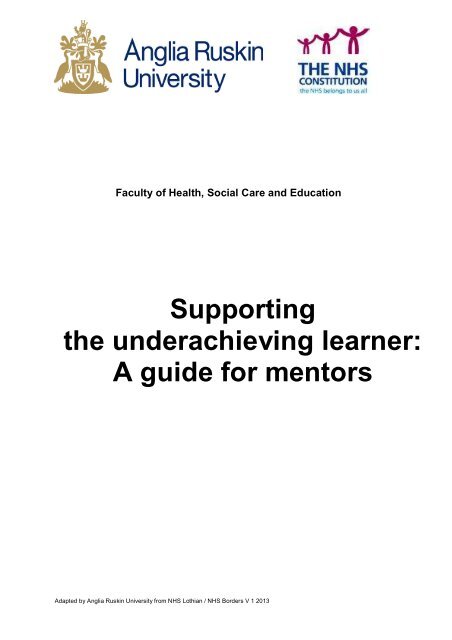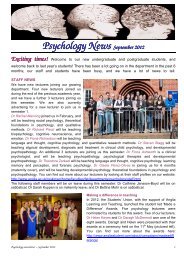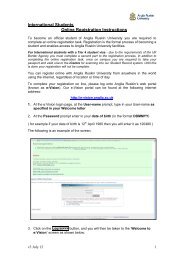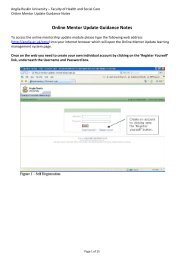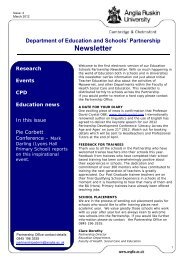Supporting the underachieving learner - Guide for mentors
Supporting the underachieving learner - Guide for mentors
Supporting the underachieving learner - Guide for mentors
Create successful ePaper yourself
Turn your PDF publications into a flip-book with our unique Google optimized e-Paper software.
Faculty of Health, Social Care and Education<br />
<strong>Supporting</strong><br />
<strong>the</strong> <strong>underachieving</strong> <strong>learner</strong>:<br />
A guide <strong>for</strong> <strong>mentors</strong><br />
Adapted by Anglia Ruskin University from NHS Lothian / NHS Borders V 1 2013
Table of Contents<br />
Page<br />
1. Introduction 3<br />
1.1. How to use this guide 3<br />
1.2. Aim of workbook 3<br />
1.3. Learning outcomes 3<br />
2. Identifying <strong>the</strong> <strong>underachieving</strong> <strong>learner</strong> 3<br />
2.1. Key behaviours of <strong>the</strong> <strong>underachieving</strong> <strong>learner</strong> 4<br />
2.2. Providing feedback 6<br />
2.3. Developing an action plan to support <strong>the</strong> <strong>underachieving</strong> <strong>learner</strong> 6<br />
2.4. How to complete a <strong>for</strong>mative action plan 9<br />
3. The decision to fail <strong>the</strong> <strong>learner</strong> 10<br />
3.1. Reactions to failing a <strong>learner</strong> 12<br />
3.2. Why do <strong>mentors</strong> fail to fail? 14<br />
3.3. What happens to <strong>the</strong> <strong>learner</strong> next? 15<br />
3.4. Summary of <strong>the</strong> fail process 15<br />
3.5. Consequences of failing to fail 15<br />
4. References 20<br />
Adapted by Anglia Ruskin University from NHS Lothian / NHS Borders V 1 2013 2
1. Introduction<br />
This workbook is intended <strong>for</strong> <strong>mentors</strong> who are currently mentoring <strong>learner</strong>s and who are on <strong>the</strong> local<br />
mentor register. It specifically focuses on <strong>the</strong> <strong>underachieving</strong> <strong>learner</strong> and provides in<strong>for</strong>mation and<br />
advice on how <strong>the</strong>se <strong>learner</strong>s may best be supported.<br />
This will enable you to provide evidence of your continued <strong>mentors</strong>hip development as required <strong>for</strong><br />
your triennia/biennial review. Please access in<strong>for</strong>mation about <strong>the</strong> triennial/biennial review at<br />
www.anglia.ac.uk/<strong>mentors</strong><br />
1.1 How to use this guide<br />
There are seven activities within this workbook, which include reflection and case scenario activities.<br />
You may find that only some of <strong>the</strong>se activities meet your learning needs and <strong>the</strong>re<strong>for</strong>e may opt to do<br />
those relevant to your current clinical situation. The concluding activity will support you in<br />
consolidating your learning.<br />
1.2 Aim of <strong>the</strong> workbook<br />
The aim of <strong>the</strong> workbook is to enable you to critically reflect on <strong>the</strong> processes involved in supporting<br />
and managing a <strong>learner</strong> who is failing to meet <strong>the</strong> NMC/HCPC proficiencies <strong>for</strong> registration and /or<br />
lacks understanding of <strong>the</strong> principles and values inherent in <strong>the</strong> NHS Constitution. The development<br />
of an action plan to resolve such situations will be discussed. This workbook can be used as portfolio<br />
evidence <strong>for</strong> your personal development plan (PDP).<br />
N.B Much of <strong>the</strong> focus in this document is on <strong>the</strong> skill of action planning. The University does not<br />
expect action planning to be limited to <strong>underachieving</strong> <strong>learner</strong>s. Action planning should benefit all<br />
<strong>learner</strong>s in progressing <strong>the</strong>ir skills and knowledge.<br />
1.3 Learning Outcomes:<br />
On completion of this workbook you should be able to:<br />
Identify and critically reflect on <strong>the</strong> common behaviours of <strong>the</strong> <strong>underachieving</strong> <strong>learner</strong>.<br />
Utilise a problem solving approach to construct an action plan to support <strong>the</strong> learning needs of<br />
an <strong>underachieving</strong> <strong>learner</strong><br />
Based on <strong>the</strong> best evidence, consider <strong>the</strong> implications of failing a <strong>learner</strong><br />
Critically reflect on <strong>the</strong> consequences of ‘failing to fail’<br />
2. Identifying <strong>the</strong> Underachieving Learner<br />
Most <strong>learner</strong>s successfully achieve <strong>the</strong>ir learning outcomes on placement. However, some <strong>learner</strong>s<br />
do not per<strong>for</strong>m at <strong>the</strong> expected level and evidence suggests that <strong>mentors</strong> find this one of <strong>the</strong> most<br />
challenging aspects of <strong>the</strong> mentoring role (Duffy and Hardicre 2007a). Many contributing factors can<br />
influence how to deal effectively with this aspect of <strong>the</strong> mentor’s role such as:<br />
Uncertainty about expected levels of competence<br />
Allowing a settling in period<br />
Time constraints<br />
Conflicting shift patterns<br />
Lack of confidence in dealing with <strong>the</strong> issue<br />
Lack of support <strong>for</strong> <strong>the</strong> mentor<br />
Mentors often have an instinctive feeling at an early stage of <strong>the</strong> placement about a <strong>learner</strong>’s<br />
per<strong>for</strong>mance but may have difficulty in articulating or describing what is often a vague concern. It is<br />
important that <strong>the</strong> mentor is able to recognise <strong>the</strong> behaviours of <strong>the</strong> <strong>underachieving</strong> <strong>learner</strong>, identify<br />
Adapted by Anglia Ruskin University from NHS Lothian / NHS Borders V 1 2013 3
<strong>the</strong>m objectively, gain support from key colleagues (Higher Education Institute (HEI) , education<br />
champions, link tutors, practice education facilitators (PEFs), line manager and peers), and take steps<br />
to address concerns in an appropriate and timely manner.<br />
Following a directive from <strong>the</strong> NMC, <strong>learner</strong>s are now required to carry a progress record of <strong>the</strong>ir<br />
achievement with summaries of previous <strong>mentors</strong>’ assessments. Please ask <strong>learner</strong>s to provide you<br />
with <strong>the</strong>ir previous practice documents. It may be valuable to review this documentation with <strong>the</strong><br />
<strong>learner</strong> to gain an understanding of how <strong>the</strong> <strong>learner</strong> views <strong>the</strong>ir previous assessment and<br />
development. Any identified factors from this should not influence your assessment decisions, but<br />
may help in<strong>for</strong>m a strategy of support and guidance.<br />
Examples of this include:<br />
Ensuring particular learning experiences are made available<br />
Offering reassurance of abilities<br />
Seeking support from <strong>the</strong> HEI regarding specific learning needs (if disclosed by <strong>the</strong> <strong>learner</strong>).<br />
Providing constructive feedback<br />
Ongoing <strong>for</strong>mative assessment<br />
Development of action plans<br />
The mentor also needs to ensure <strong>the</strong>y have a realistic expectation of per<strong>for</strong>mance <strong>for</strong> <strong>the</strong> stage in <strong>the</strong><br />
<strong>learner</strong>’s programme. Discussing this with <strong>the</strong> <strong>learner</strong> and considering <strong>the</strong> appropriate practice<br />
assessment document can help clarify <strong>the</strong> knowledge and skills expected from <strong>the</strong> <strong>learner</strong>. If<br />
necessary seek additional advice from <strong>the</strong> relevant HEI education champion and link tutor.<br />
2.1 Key behaviours of <strong>the</strong> <strong>underachieving</strong> <strong>learner</strong><br />
Whilst many <strong>mentors</strong> voice concerns around <strong>the</strong> <strong>the</strong>oretical knowledge and practical skills displayed<br />
by a <strong>learner</strong>, <strong>the</strong>y often state that <strong>the</strong>y have more difficulty in objectively identifying and measuring<br />
<strong>the</strong> per<strong>for</strong>mance of those <strong>learner</strong>s who display 'problematic behaviour' or have an 'attitude' problem.<br />
The <strong>underachieving</strong> <strong>learner</strong>s often display a range of behaviours as identified by research conducted<br />
by Maloney et al. 1997; Skingley et al. 2007; Duffy 2003.<br />
Examples of behaviours of <strong>the</strong> <strong>underachieving</strong> <strong>learner</strong> include:<br />
Unenthusiastic attitude - not asking questions, lack of motivation or interest<br />
Unreliable - poor punctuality or poor attendance<br />
Displays high level of anxiety - lacks confidence or initiative<br />
Inconsistent or erratic clinical per<strong>for</strong>mance<br />
Lack of <strong>the</strong>ory, knowledge, skill and provides little evidence to support <strong>the</strong>ir learning<br />
Care incomplete - patients not left com<strong>for</strong>table, poor record of care given, not passing on<br />
relevant/important in<strong>for</strong>mation<br />
Dismissive of learning opportunities - “done that be<strong>for</strong>e, don’t want to repeat”<br />
Avoidance of working with mentor - changing shifts<br />
Poor interpersonal skills - insensitive in interaction with patient/client/family<br />
Lack of insight into <strong>the</strong>ir behaviour and lack of response to feedback<br />
Preoccupied with personal issues / continual health issues<br />
Unsafe practice or judgements<br />
Absence of professional boundaries and poor professional behaviour<br />
Failure to progress and develop skills through placement<br />
Maloney et al. 1997; Skingley et al. 2007; Duffy 2003<br />
Adapted by Anglia Ruskin University from NHS Lothian / NHS Borders V 1 2013 4
You may find <strong>the</strong> following articles useful:<br />
Duffy, K. and Hardicre, J. (2007a) '<strong>Supporting</strong> Failing Learners in Practice 1: Assessment',<br />
Nursing Times 103 (47), pp28-29<br />
Duffy, K. and Hardicre, J. (2007b) '<strong>Supporting</strong> Failing Learners in Practice 2: Management',<br />
Nursing Times 103 (47), pp28-29<br />
Sharples, K. and Kelly, D. (2007) '<strong>Supporting</strong> <strong>mentors</strong> in practice', Nursing Standard 21 (39),<br />
pp44-47<br />
Activity 1<br />
With ano<strong>the</strong>r mentor consider any experience you or <strong>the</strong>y have had of <strong>learner</strong>s who displayed<br />
some of <strong>the</strong> behaviours of underachievement.<br />
What were <strong>the</strong>se behaviours and how were <strong>the</strong>y addressed?<br />
Can you think of fur<strong>the</strong>r examples of o<strong>the</strong>r actions or behaviour that might cause you concern<br />
about a <strong>learner</strong>’s per<strong>for</strong>mance?<br />
At any stage in <strong>the</strong> mentoring process, it is essential that as soon as it is recognised that <strong>the</strong> <strong>learner</strong><br />
is not per<strong>for</strong>ming to expected standards, <strong>the</strong> mentor should take appropriate action. This should<br />
involve:<br />
Discussing concerns with colleagues to consider <strong>the</strong>ir view of <strong>the</strong> <strong>learner</strong>’s per<strong>for</strong>mance. Do<br />
o<strong>the</strong>rs recognise your concerns?<br />
Collating objective evidence to demonstrate areas or aspects of per<strong>for</strong>mance that are causing<br />
concern. This could be about specific skills, care episodes or attitudes.<br />
Discussing <strong>the</strong>se concerns with <strong>the</strong> <strong>learner</strong> to gauge <strong>the</strong>ir knowledge and self awareness.<br />
The mentor should also involve <strong>the</strong> appropriate HEI education champion, link tutor and <strong>the</strong> PEF. This<br />
will ensure that key staff are aware and appropriate support put in place to give <strong>the</strong> <strong>learner</strong> full<br />
opportunity to address <strong>the</strong>ir learning needs or behaviour, and improve <strong>the</strong>ir per<strong>for</strong>mance. Involving<br />
<strong>the</strong> education champion, link tutor and PEF will also enable <strong>the</strong> mentor to be supported in <strong>the</strong>ir role<br />
and ensure objectivity in <strong>the</strong>ir assessment decisions. Anglia Ruskin University link teams aim to<br />
provide weekly support in visiting <strong>underachieving</strong> <strong>learner</strong>s and <strong>the</strong>ir <strong>mentors</strong>.<br />
Adapted by Anglia Ruskin University from NHS Lothian / NHS Borders V 1 2013 5
2.2 Providing feedback<br />
An important part of this process involves giving constructive feedback to <strong>the</strong> <strong>learner</strong>. Providing<br />
positive feedback when a <strong>learner</strong> is per<strong>for</strong>ming to <strong>the</strong> expected standard is a relatively straight<strong>for</strong>ward<br />
activity. However, when faced with <strong>the</strong> <strong>underachieving</strong> <strong>learner</strong> and <strong>the</strong> need to improve <strong>the</strong>ir<br />
per<strong>for</strong>mance, it is much more challenging.<br />
If feedback is required consider <strong>the</strong> type of feedback that you want to give. Whe<strong>the</strong>r written or verbal,<br />
it is important <strong>the</strong> <strong>learner</strong> understands that you are per<strong>for</strong>ming <strong>the</strong> feedback as part of <strong>the</strong> overall<br />
assessment. It is important to avoid delay, to allow <strong>the</strong> <strong>learner</strong> to reflect as close to <strong>the</strong> event as<br />
possible. This will also give <strong>the</strong> <strong>learner</strong> more time within <strong>the</strong>ir placement to provide you with <strong>the</strong><br />
evidence of <strong>the</strong>ir learning and <strong>the</strong> changes <strong>the</strong>y have made. It is also necessary to explain to <strong>the</strong><br />
<strong>learner</strong> your perception of <strong>the</strong>ir progress. This allows you to supportively challenge, whilst explaining<br />
how you as a professional came to your conclusion.<br />
Relate your observations back to <strong>the</strong> <strong>learner</strong>’s learning outcomes. Be specific and use examples of<br />
practice or behaviour you wish to highlight. Using phrases such as ‘I noticed.., I feel…’ can help as<br />
this rein<strong>for</strong>ces to <strong>the</strong> <strong>learner</strong> that as <strong>the</strong> mentor you are required to make a judgement on <strong>the</strong>ir<br />
progress using <strong>the</strong> evidence at your disposal. Giving constructive feedback will provide <strong>the</strong><br />
opportunity to discover if <strong>the</strong> <strong>learner</strong> has insight into his/her development needs.<br />
To conclude, it is important to reiterate <strong>the</strong> key points that have been discussed and explore with <strong>the</strong><br />
<strong>learner</strong> how you as <strong>the</strong> mentor can help facilitate <strong>the</strong> remainder of <strong>the</strong>ir practice placement. It is<br />
important to consider <strong>the</strong> professional opinions of your colleagues if <strong>the</strong>y have been involved in<br />
supporting <strong>the</strong> <strong>learner</strong> you are assessing. This may include supportive educational staff from within<br />
<strong>the</strong> clinical area or <strong>the</strong> HEI. The <strong>for</strong>mulation of an action plan will give structure to <strong>the</strong> assessment<br />
process and help <strong>the</strong> <strong>learner</strong> achieve <strong>the</strong>ir learning outcomes.<br />
You may want to look at <strong>the</strong> following articles <strong>for</strong> more detail on providing feedback:<br />
Duffy, K. and Hardicre, J. (2007a) '<strong>Supporting</strong> Failing Students in Practice 1: Assessment',<br />
Nursing Times 103 (47), pp28-29<br />
Royal College of Nursing (2007) Guidance <strong>for</strong> <strong>mentors</strong> of students nurses and midwives: An<br />
RCN Toolkit. Royal College of Nursing: London.<br />
2.3 Developing an action plan to support <strong>the</strong> <strong>underachieving</strong> <strong>learner</strong><br />
Documenting any concerns about <strong>the</strong> <strong>learner</strong> is key to <strong>the</strong> process of supporting and mentoring an<br />
<strong>underachieving</strong> <strong>learner</strong>. This in<strong>for</strong>mation will be required when providing evidence of support if <strong>the</strong><br />
<strong>learner</strong> eventually fails. The principles <strong>for</strong> good record keeping need to be applied and <strong>the</strong><br />
documentation should be:<br />
Factual<br />
Non-judgmental<br />
Identify strengths and weaknesses and<br />
Include specific examples when appropriate<br />
It is recommended that if <strong>the</strong> mentor needs to develop an action plan <strong>the</strong>y contact <strong>the</strong> relevant HEI<br />
education champion, link tutor and <strong>the</strong> PEF to make <strong>the</strong>m aware of <strong>the</strong> situation and <strong>for</strong> support.<br />
Below are actions that could be taken to support <strong>the</strong> <strong>underachieving</strong> <strong>learner</strong> and help enable <strong>the</strong>m to<br />
achieve <strong>the</strong>ir placement learning outcomes.<br />
Adapted by Anglia Ruskin University from NHS Lothian / NHS Borders V 1 2013 6
Actions to support <strong>the</strong> <strong>underachieving</strong> <strong>learner</strong><br />
Invite <strong>the</strong> <strong>learner</strong> to conduct ei<strong>the</strong>r a written or verbal self-assessment feedback on <strong>the</strong>ir<br />
progress to date<br />
Formulate an action plan<br />
Clearly identify evidence of success<br />
Formulate learning objectives <strong>for</strong> <strong>the</strong> next meeting<br />
Identify appropriate learning opportunities to meet <strong>the</strong> objectives<br />
Identify required knowledge input and sources of <strong>the</strong>se<br />
Plan <strong>the</strong> date of <strong>the</strong> next meeting.<br />
Activity 2<br />
Duffy and Hardicre 2007a<br />
With ano<strong>the</strong>r mentor discuss <strong>the</strong> importance and significance of <strong>the</strong>se recommended actions.<br />
Can you think of any fur<strong>the</strong>r actions that may be important to do at this stage to support <strong>the</strong><br />
<strong>learner</strong>?<br />
Although <strong>the</strong> development of an action plan may be a difficult task <strong>for</strong> a mentor and <strong>learner</strong>, <strong>the</strong><br />
exercise can be confidence building and sets clear guidance on areas that <strong>the</strong> <strong>learner</strong> requires fur<strong>the</strong>r<br />
knowledge, skills and development. This is a good opportunity to utilise colleagues <strong>for</strong> advice and<br />
support.<br />
Figure 1 provides a template <strong>for</strong> an action plan and it is recommended that it should:<br />
Identify learning outcomes / areas <strong>for</strong> development<br />
Detail how learning outcomes will be achieved (<strong>the</strong> actions and resources required)<br />
List evidence of achievement.<br />
Provide a date <strong>for</strong> achievement<br />
Be agreed and signed by both <strong>the</strong> mentor and <strong>learner</strong>.<br />
Adapted by Anglia Ruskin University from NHS Lothian / NHS Borders V 1 2013 7
FIGURE 1: Formative Action Plan<br />
(To be completed by <strong>learner</strong> and mentor)<br />
STUDENT SID:<br />
Student Name: ____________________________________ Mentor Name: _______________________________________________<br />
Date Learning Outcomes/<br />
Areas <strong>for</strong> development<br />
Learning<br />
Resources/Actions<br />
Evidence of<br />
achievement<br />
Review Date<br />
Mentor<br />
signature<br />
Student<br />
signature<br />
Needs and interests,<br />
areas of Essential<br />
knowledge and skill.<br />
Methods and situations <strong>for</strong><br />
how and when learning can<br />
occur.<br />
Achieved/Not<br />
achieved<br />
Adapted by Anglia Ruskin University from NHS Lothian / NHS Borders V 1 2013 8
2.4 How to complete a Formative Action Plan<br />
Student Name: _____________________________________ Mentor Name: _______________________________________________<br />
Date Learning Outcomes/ Areas<br />
<strong>for</strong> development<br />
Learning Resources/Actions Evidence of<br />
achievement<br />
Review Date<br />
Mentor<br />
signature<br />
Student<br />
signature<br />
Needs and interests, areas of<br />
essential knowledge and skill.<br />
Methods and situations <strong>for</strong> how<br />
and when learning can occur.<br />
Achieved/Not<br />
achieved<br />
Identify <strong>the</strong> areas that <strong>the</strong> <strong>learner</strong><br />
requires to obtain fur<strong>the</strong>r knowledge,<br />
skills, competence or changes in<br />
attitude.<br />
A useful starting point when<br />
completing this is to refer to <strong>the</strong><br />
<strong>learner</strong>’s Practice Assessment<br />
Document. This will enable you to<br />
identify areas <strong>for</strong> development and<br />
determine which areas <strong>the</strong> <strong>learner</strong><br />
needs to address in order to achieve<br />
<strong>the</strong> adequate level of competence<br />
and placement learning outcomes.<br />
Examples of <strong>the</strong>se include<br />
The inability to administer medicines<br />
correctly<br />
Identify <strong>the</strong> actions required to<br />
specifically enable <strong>the</strong> <strong>learner</strong> to<br />
improve in <strong>the</strong>ir per<strong>for</strong>mance.<br />
These could include reading,<br />
observation of practice or undertaking<br />
specific tasks.<br />
An example of this in relation to<br />
inability to administer medicines<br />
correctly could be to:<br />
1. Read <strong>the</strong> NMC <strong>Guide</strong>line <strong>for</strong><br />
Administering Medicines<br />
2. Read <strong>the</strong> trust policy on Medicine<br />
Administration<br />
3. With a registered nurse/midwife<br />
participate in drug administration <strong>for</strong> 6<br />
patients at least twice weekly.<br />
This should include how<br />
<strong>the</strong> mentor and <strong>learner</strong><br />
are going to ascertain<br />
whe<strong>the</strong>r <strong>the</strong> areas <strong>for</strong><br />
development have been<br />
adequately improved.<br />
The <strong>learner</strong> must provide<br />
evidence of improvement<br />
in knowledge, skills,<br />
competence or change in<br />
attitude in relation to <strong>the</strong><br />
areas <strong>for</strong> development.<br />
A range of <strong>the</strong> following<br />
provide examples of<br />
<strong>the</strong>se:<br />
1. Observation in practice<br />
by <strong>the</strong> mentor<br />
2. Reflection<br />
A date should be<br />
set to review <strong>the</strong><br />
<strong>learner</strong>’s progress<br />
to ascertain<br />
whe<strong>the</strong>r <strong>the</strong>ir<br />
knowledge, skills,<br />
competence or<br />
change in attitude<br />
are progressing or<br />
have been<br />
achieved.<br />
Ideally this should<br />
be on a weekly<br />
basis and <strong>the</strong><br />
principles <strong>for</strong><br />
effective feedback<br />
should be followed<br />
at <strong>the</strong>se meetings.<br />
Poor attendance and/or punctuality<br />
Lack of ability to prioritise care.<br />
4. Undertake <strong>the</strong> necessary<br />
patient/client checks in accordance<br />
with <strong>the</strong> NMC and trust policy when<br />
administering medication to patients.<br />
5. Observe registered<br />
nurses/midwives administering<br />
controlled drugs and discuss <strong>the</strong><br />
procedures <strong>the</strong>y undertake and <strong>the</strong><br />
rationale <strong>for</strong> <strong>the</strong>se.<br />
3. Feedback from <strong>the</strong><br />
multi-disciplinary team<br />
4. Production of mock<br />
documents (<strong>for</strong> example<br />
admission sheets and<br />
care plans)<br />
5. Discussion with<br />
mentor.<br />
Adapted by Anglia Ruskin University from NHS Lothian / NHS Borders V 1 2013 9
3. The Decision to Fail <strong>the</strong> Learner<br />
Completing an action plan to support <strong>the</strong> <strong>learner</strong> in achieving <strong>the</strong>ir learning outcomes will enable <strong>the</strong><br />
mentor to identify <strong>the</strong> necessary areas <strong>the</strong> <strong>learner</strong> has to develop in. If <strong>the</strong> mentor has undertaken this<br />
exercise and <strong>the</strong> <strong>learner</strong> still does not meet <strong>the</strong> necessary skills, knowledge or competence <strong>the</strong>y will need<br />
to fail <strong>the</strong> <strong>learner</strong>.<br />
Duffy (2003) highlighted <strong>the</strong> challenges that <strong>mentors</strong> face in following <strong>the</strong> correct procedures <strong>for</strong><br />
supporting an <strong>underachieving</strong> / failing <strong>learner</strong>. These procedures were divided into four sub-categories:<br />
1. Identifying <strong>the</strong> <strong>underachieving</strong> <strong>learner</strong><br />
2. Developing an action plan<br />
3. The decision to fail<br />
4. “After <strong>the</strong> deed is done”<br />
Actions required to address <strong>the</strong>se challenges <strong>for</strong> <strong>the</strong> first two categories have already been covered.<br />
However, <strong>the</strong>re will be times when despite <strong>the</strong>se remedial interventions, per<strong>for</strong>mance will remain poor<br />
and <strong>the</strong>re <strong>the</strong>n needs to be clear and decisive action taken.<br />
Activity 3<br />
To fail or not to fail?<br />
Take some time to reflect on <strong>the</strong> following statements and how <strong>the</strong>y could influence<br />
your decision to fail / not fail a <strong>learner</strong>:<br />
“The assessment of students in practice, whatever <strong>the</strong> setting has long been accepted as integral to any<br />
nurse education programme leading to a recognized professional qualification. Its importance lies not<br />
only in <strong>the</strong> need to certify competent practitioners, but also as a guarantor of patient safety and public<br />
protection”<br />
(Skingley et al. 2007 p28)<br />
“It is naïve to assume that all students entering clinical placement will have <strong>the</strong> knowledge, skills and<br />
attitude to be successful. There will always be students on practice placements who struggle to achieve<br />
competence. Mentors who fail to evaluate a <strong>learner</strong>’s unsatisfactory per<strong>for</strong>mance accurately are guilty of<br />
misleading <strong>the</strong> <strong>learner</strong>, potentially jeopardising patient safety and failing in <strong>the</strong>ir accountability to <strong>the</strong><br />
NMC” (Sharples and Kelly 2007 p44)<br />
“It is inevitable that some students will not be able to meet <strong>the</strong> required level of practice and it is essential<br />
that <strong>mentors</strong> do not avoid <strong>the</strong> difficult issue of having to fail <strong>the</strong>se students” (Royal College of Nursing<br />
2007 p14)<br />
Adapted by Anglia Ruskin University from NHS Lothian / NHS Borders V 1 2013 10
The decision to fail a <strong>learner</strong> is a challenging situation and needs to be handled with sensitivity. Skill and<br />
confidence is required to manage <strong>the</strong> situation effectively. The most important aspect to note is that<br />
nothing should come as a surprise to <strong>the</strong> <strong>learner</strong>.<br />
Assuming <strong>the</strong> process of identifying and supporting <strong>the</strong> failing <strong>learner</strong> has been properly carried out <strong>the</strong>n<br />
<strong>the</strong> decision can be arrived at with added conviction and confidence. This should include:<br />
The giving of constructive feedback<br />
The development of an appropriate action plan<br />
Enhanced supervision and documentation of evidence and meetings<br />
Whose decision is it anyway?<br />
Remember if <strong>the</strong> processes <strong>for</strong> dealing with a failing <strong>learner</strong> have been followed <strong>the</strong>n you will have<br />
already contacted and received support from <strong>the</strong> HEI education champion, link lecturer, PEF, colleagues<br />
and/or managers. However it needs to be recognised that:<br />
“As <strong>the</strong> named mentor, you are responsible <strong>for</strong> making <strong>the</strong> final assessment decision and are<br />
accountable <strong>for</strong> passing or failing <strong>the</strong> student. The grade you award should reflect <strong>the</strong> student’s standard<br />
of practice in <strong>the</strong> latter part of <strong>the</strong> placement. The NMC (2008) standards state that <strong>mentors</strong> must keep<br />
sufficient records to support and justify <strong>the</strong>ir decisions on whe<strong>the</strong>r a student is or is not proficient.”<br />
Activity 4<br />
Bearing in mind your accountability as a mentor <strong>for</strong> making <strong>the</strong> final assessment decision, consider <strong>the</strong><br />
following scenario :<br />
Scenario: Barbara Smith is <strong>the</strong> named mentor to a <strong>learner</strong> called Anne who has struggled considerably<br />
to meet her learning outcomes. Barbara has been reviewing progress with her weekly. Anne is now<br />
approaching <strong>the</strong> end of her placement and has not achieved <strong>the</strong> required standards and in Barbara’s<br />
opinion should be failed. A colleague who has also worked with Anne argues strongly that Anne’s<br />
practice is reasonable and that she should be passed.<br />
What should Barbara do?<br />
Adapted by Anglia Ruskin University from NHS Lothian / NHS Borders V 1 2013 11
As already discussed, <strong>the</strong> decision to fail a <strong>learner</strong> is never an easy one to make. When ano<strong>the</strong>r<br />
assessor disagrees with your decision <strong>the</strong>n <strong>the</strong> situation becomes even more complicated.<br />
A possible starting point could be to check that both assessors are using <strong>the</strong> same criteria to assess <strong>the</strong><br />
<strong>learner</strong>, as this will establish whe<strong>the</strong>r that <strong>the</strong> evidence is reliable or not. The next step could be to<br />
consider <strong>the</strong> validity of <strong>the</strong> evidence used or to put it ano<strong>the</strong>r way, whe<strong>the</strong>r you have been assessing<br />
what should be assessed. If agreement still cannot be reached <strong>the</strong>n <strong>the</strong> following actions could be<br />
considered:<br />
1. Arrange a meeting with <strong>the</strong> senior health care professional responsible <strong>for</strong> education within <strong>the</strong><br />
ward or department to discuss <strong>the</strong> situation<br />
2. Arrange a meeting with <strong>the</strong> HEI education champion, link tutor and PEF to discuss <strong>the</strong><br />
situation.<br />
These actions may already have been taken as part of <strong>the</strong> normal process of dealing with a failing<br />
<strong>learner</strong>.<br />
In relation to <strong>the</strong> scenario, Barbara should talk to her colleague, highlighting <strong>the</strong> process and reviewing<br />
<strong>the</strong> collated evidence (including discussions with colleagues, <strong>the</strong> HEI education champion, link tutor,<br />
PEF, managers), which backs her decision to fail <strong>the</strong> <strong>learner</strong>. The mentor remains accountable <strong>for</strong> <strong>the</strong><br />
final assessment decision.<br />
3.1 Reactions to failing a <strong>learner</strong><br />
The failing of a <strong>learner</strong> can cause considerable feelings and reactions <strong>for</strong> both <strong>the</strong> mentor and <strong>the</strong><br />
<strong>learner</strong>.<br />
Activity 5<br />
Take 5 minutes to consider how you might react in a situation where you had to fail a <strong>learner</strong><br />
Adapted by Anglia Ruskin University from NHS Lothian / NHS Borders V 1 2013 12
Failing a <strong>learner</strong> can have a number of effects on <strong>mentors</strong> and sometimes <strong>the</strong> whole health care team<br />
and <strong>the</strong>y may include:<br />
Frustration with <strong>learner</strong>s’ lack of positive change and resentful and angry about <strong>the</strong> demands <strong>the</strong><br />
<strong>learner</strong> places on <strong>the</strong>m<br />
Concern that <strong>the</strong>ir own skills are inadequate <strong>for</strong> a specific <strong>learner</strong>’s needs<br />
Ambivalence about <strong>the</strong>ir commitment to <strong>the</strong> dual role of nurse/ midwife and mentor<br />
Resistance to recognising serious learning difficulties because <strong>the</strong>y want <strong>the</strong> <strong>learner</strong> to succeed<br />
Anxiety that <strong>the</strong>ir own expectations are unrealistic <strong>for</strong> <strong>the</strong> <strong>learner</strong>’s stage of learning.<br />
Fear of being overruled by <strong>the</strong> HEI<br />
Maloney et al. (1997)<br />
The mentor may feel tension at <strong>the</strong> conflict between <strong>the</strong> teaching, supportive role and <strong>the</strong> assessing<br />
component and see <strong>the</strong> failure of <strong>the</strong> <strong>learner</strong> as a personal reflection of <strong>the</strong>ir standards of supervision and<br />
teaching. These reactions and effects can interfere with <strong>the</strong> fail scenario and lead to avoidance or a<br />
'failing to fail' picture developing. This was highlighted by Duffy (2003) in a report entitled “Failing<br />
students: ‘A qualitative study of factors that influence <strong>the</strong> decisions regarding <strong>the</strong> assessment of <strong>learner</strong>s’<br />
competence to practice’.<br />
Stuart (2003) highlights <strong>the</strong> o<strong>the</strong>r end of <strong>the</strong> continuum with <strong>the</strong> rare potential of <strong>mentors</strong> abusing <strong>the</strong><br />
power to fail and using it as a tool to exert control and punish 'difficult' or 'unpopular' <strong>learner</strong>s.<br />
Failed <strong>learner</strong>s may react in a number of ways. These reactions should be seen as a response to <strong>the</strong><br />
news of failure as opposed to a personal attack or vendetta against <strong>the</strong> mentor. Learners need time to<br />
process <strong>the</strong> in<strong>for</strong>mation and 'grieve' <strong>for</strong> <strong>the</strong>ir loss as a result of failing <strong>the</strong> placement. There<strong>for</strong>e <strong>the</strong><br />
discussions should be conducted in private with adequate time given to ensure that <strong>the</strong> appropriate<br />
support is provided.<br />
Activity 6<br />
Take 5 minutes to consider <strong>the</strong> possible reaction from <strong>the</strong> <strong>learner</strong> if <strong>the</strong>y are failed and how you might<br />
manage <strong>the</strong>m.<br />
Adapted by Anglia Ruskin University from NHS Lothian / NHS Borders V 1 2013 13
The <strong>learner</strong> may also have a number of reactions when <strong>the</strong>y fail and <strong>the</strong>se may include:-<br />
Denial - <strong>the</strong> <strong>learner</strong>’s perception of <strong>the</strong>ir competence differs from that of <strong>the</strong> mentor. They may<br />
deny or make excuses <strong>for</strong> <strong>the</strong>ir behaviours. The discussion needs to be focused on <strong>the</strong> learning<br />
outcomes that were not met.<br />
Anger - <strong>the</strong> <strong>learner</strong> may become abusive and accusing. If <strong>the</strong> mentor suspects that this situation<br />
may arise <strong>the</strong>n it may be wise to have <strong>the</strong> presence of a third party such as a HEI education<br />
champion, link tutor or PEF. The anger should not be taken personally.<br />
Bargaining - <strong>the</strong> <strong>learner</strong> may attempt to bargain <strong>for</strong> a pass grade. The mentor needs to stand firm<br />
and remain focused on <strong>the</strong> learning outcomes that were not achieved.<br />
Sadness - <strong>the</strong> <strong>learner</strong> may begin to cry. Allow <strong>the</strong>m to cry be<strong>for</strong>e going onto discuss <strong>the</strong> reasons<br />
<strong>for</strong> failure.<br />
Relief - some <strong>learner</strong>s may not want to be a registered health care professional but have not had<br />
<strong>the</strong> courage to make <strong>the</strong> decision <strong>for</strong> <strong>the</strong>mselves or <strong>the</strong>y have felt insecure about <strong>the</strong>ir clinical<br />
competence and learning.<br />
Stuart (2003)<br />
Some <strong>learner</strong>s learn from <strong>the</strong> experience of failure and go on to achieve success. They are able to seek<br />
out and understand <strong>the</strong> 'how come' of <strong>the</strong> failure and use this to make positive change (Maloney et al.<br />
1997). However, it is generally <strong>the</strong> case that failure is not a positive experience <strong>for</strong> most <strong>learner</strong>s!<br />
3.2 Why do <strong>mentors</strong> fail to fail?<br />
Research over recent years has identified many of <strong>the</strong> complex reasons why <strong>mentors</strong> and assessors find<br />
it difficult to assign a fail decision (Duffy 2004, Scholes and Albarran 2005, Skingley et al. 2007).<br />
What reasons did <strong>mentors</strong> give in <strong>the</strong> above research <strong>for</strong> not failing a <strong>learner</strong>?<br />
Mentors were loath to fail a <strong>learner</strong> knowing that this meant additional, time consuming work <strong>for</strong><br />
<strong>the</strong>m, as well as having to deal with <strong>the</strong> <strong>learner</strong>’s reaction.<br />
Mentors experienced tension between <strong>the</strong>ir role of carer and nurturer, with <strong>the</strong> failing of a <strong>learner</strong><br />
being contrary to <strong>the</strong> educational goals of facilitation and development. This could also lead to a<br />
sense of personal failure.<br />
Mentors lacked confidence in assessing, felt <strong>the</strong>y had inadequate preparation <strong>for</strong> <strong>the</strong>ir role, were<br />
unsure of <strong>the</strong>ir decisions and often felt <strong>the</strong>y had to give <strong>learner</strong>s <strong>the</strong> benefit of <strong>the</strong> doubt.<br />
Mentors did not feel prepared <strong>for</strong> that level of responsibility and felt it was <strong>the</strong> university’s<br />
responsibility.<br />
Learners could manipulate <strong>the</strong> mentor or system to avoid failure.<br />
Mentors expressed a lack of support from colleagues, managers and education staff when faced<br />
with a failing <strong>learner</strong>, even experiencing pressure to pass <strong>learner</strong>s.<br />
It is difficult to fail <strong>learner</strong>s in <strong>the</strong>ir 3rd year as <strong>mentors</strong> do not want to be responsible <strong>for</strong><br />
jeopardising a <strong>learner</strong>’s career so late in <strong>the</strong> programme. (Learners also felt “devastated” at being<br />
failed at this late stage and <strong>mentors</strong> felt anger that previous <strong>mentors</strong> had “passed <strong>the</strong> buck”).<br />
Adapted by Anglia Ruskin University from NHS Lothian / NHS Borders V 1 2013 14
Equally difficult is failing 1st year <strong>learner</strong>s as <strong>the</strong>re is a notion held that problems will resolve as<br />
<strong>learner</strong>s progress through <strong>the</strong>ir programme.<br />
Learners’ personal problems can influence <strong>the</strong> mentor’s judgement.<br />
If <strong>mentors</strong> had not followed all <strong>the</strong> correct procedures or felt that <strong>the</strong>y did not know <strong>the</strong> <strong>learner</strong><br />
well enough, <strong>the</strong>y felt unable to make a fail decision and again felt that <strong>the</strong>y had to give <strong>the</strong> benefit<br />
of <strong>the</strong> doubt.<br />
Mentors had found <strong>the</strong> practice assessment documentation so full of educational jargon <strong>the</strong>y had<br />
difficulty in linking <strong>learner</strong> per<strong>for</strong>mance to learning outcomes. Consequently obscure generalized<br />
comments are written which do not specify <strong>the</strong> underlying concerns about <strong>the</strong> <strong>learner</strong>’s<br />
per<strong>for</strong>mance.<br />
3.3 What happens to <strong>the</strong> <strong>learner</strong> next?<br />
If this is <strong>the</strong> first time that a <strong>learner</strong> has failed <strong>the</strong> placement experience <strong>the</strong>n <strong>the</strong>y are given an<br />
opportunity to repeat <strong>the</strong> outcomes that <strong>the</strong>y have failed. This may take place in ano<strong>the</strong>r practice area but<br />
where appropriate <strong>the</strong> <strong>learner</strong> will be expected to repeat <strong>the</strong>se outcomes in <strong>the</strong> same practice area with<br />
<strong>the</strong> same mentor. If <strong>the</strong> <strong>learner</strong> is required to change placements to repeat <strong>the</strong>se outcomes, <strong>the</strong><br />
documentation identifying reasons <strong>for</strong> failure will be made available to <strong>the</strong> new mentor.<br />
There should be no surprises when a <strong>learner</strong> fails a placement and this includes <strong>the</strong> appropriate HEI,<br />
who should be aware from an early stage of potential / actual difficulties in achieving learning outcomes.<br />
The <strong>learner</strong> has access to a range of support services from <strong>the</strong> HEI, which includes education<br />
champions, link tutors, personal tutors, module leaders, course leaders, counselling and <strong>learner</strong> union<br />
services to help through <strong>the</strong> fail process.<br />
3.4 Summary of <strong>the</strong> fail process<br />
The following points summarise <strong>the</strong> challenges and actions required when failing a <strong>learner</strong>:<br />
Difficult task <strong>for</strong> all involved<br />
Ensure discussions are conducted in private<br />
Re-iterate <strong>the</strong> problem and provide evidence to substantiate concerns<br />
Involve <strong>the</strong> HEI in <strong>the</strong> meeting through <strong>the</strong> education champion, link tutor and PEF<br />
Keep <strong>the</strong> focus on learning<br />
Never make comparisons with o<strong>the</strong>r <strong>learner</strong>s<br />
Ensure <strong>the</strong> <strong>learner</strong> is supported throughout <strong>the</strong> discussion.<br />
3.5 The consequences of ‘failing to fail’<br />
There is no doubt that failing a <strong>learner</strong> is a difficult and stressful experience <strong>for</strong> both <strong>the</strong> <strong>learner</strong> and <strong>the</strong><br />
mentor. However knowledge of one’s accountability as a mentor and <strong>the</strong> process of managing an<br />
<strong>underachieving</strong> / failing <strong>learner</strong> mean that decisions can be made with more confidence.<br />
Mentors are regarded as ‘gatekeepers’ ensuring that those <strong>learner</strong>s, who do not achieve <strong>the</strong>ir outcomes<br />
and competencies in practice, are not entered on to <strong>the</strong> professional register. This vital stage of <strong>the</strong><br />
assessment process protects <strong>the</strong> public from unsafe, incompetent and unscrupulous practitioners. There<br />
are however some concerns about how effective this ‘gate keeping’ role is being per<strong>for</strong>med. Failure to fail<br />
can have serious consequences <strong>for</strong> <strong>the</strong> health and wellbeing of <strong>the</strong> public we serve.<br />
Adapted by Anglia Ruskin University from NHS Lothian / NHS Borders V 1 2013 15
Kath Duffy (2003) in her summary of her research says:<br />
“Failing to tell students that <strong>the</strong>y have not reached <strong>the</strong> required standards also has consequences <strong>for</strong> <strong>the</strong><br />
profession. Tutors talked about students who had qualified despite having a history of problems. Passing<br />
students who should have failed does not protect <strong>the</strong> interests of <strong>the</strong> public and puts <strong>the</strong> patients who will<br />
be under <strong>the</strong>ir care at risk. This is not a new problem but one which, as professionals, we need to<br />
acknowledge, discuss and debate”.<br />
“The reality of being a mentor is that it is a complex and demanding role. Add in <strong>the</strong> issue of a<br />
problematic student and it can be overwhelming. Mentors need effective preparation and support to deal<br />
with under-per<strong>for</strong>ming students. When faced with a problematic student, <strong>mentors</strong> need extra time and<br />
guidance to fulfil <strong>the</strong>ir professional responsibility; help from experienced <strong>mentors</strong> and tutors; and strong<br />
line management support.<br />
Most importantly <strong>the</strong>re has to be <strong>the</strong> recognition that some students need to fail. So if you are thinking of<br />
giving a student <strong>the</strong> benefit of <strong>the</strong> doubt <strong>the</strong>n you should consider whe<strong>the</strong>r it is in <strong>the</strong> best interests of <strong>the</strong><br />
patients, your clients, <strong>the</strong> student, subsequent <strong>mentors</strong> and <strong>the</strong> profession as a whole.”<br />
The consequences of failing to fail in terms of public safety, protection and professional accountability<br />
have been clearly identified and recognised by <strong>the</strong> NMC. This has been a major driver in <strong>the</strong><br />
development of <strong>mentors</strong>hip through <strong>the</strong> NMC Standards to support learning and assessment in practice<br />
(SLAiP, 2008).<br />
Please see suggested reading which will help you explore <strong>the</strong> issues around <strong>the</strong> process of failing a<br />
<strong>learner</strong> and <strong>the</strong> consequences of not failing a <strong>learner</strong>:<br />
Duffy,K. (2003) Failing Students: A Qualitative Study of Factors that influence <strong>the</strong> Decisions Regarding<br />
Assessment of Students' Competence in Practice. Glasgow: Caledonian University.<br />
Scholes, J. and Albarran, J. (2005) 'Failure to fail: facing <strong>the</strong> consequences of inaction', Nursing in Critical<br />
Care 10 (3), pp23-27<br />
Adapted by Anglia Ruskin University from NHS Lothian / NHS Borders V 1 2013 16
Activity 7<br />
Consider <strong>the</strong> following scenario, or use a real-life experience of supporting an <strong>underachieving</strong><br />
<strong>learner</strong> and undertake <strong>the</strong> focused activities:<br />
Scenario: You are a mentor <strong>for</strong> Amanda, a <strong>learner</strong> in her final year and approaching qualification. She is<br />
in Week 4 of her last placement which is 12 weeks long. She is a very kind and caring person, always<br />
willing to help. Amanda is competent in providing general care and is well liked by <strong>the</strong> team. You notice,<br />
however, that she has difficulty in being able to prioritise and co-ordinate <strong>the</strong> care needs of <strong>the</strong> patient<br />
group she has responsibility <strong>for</strong>.<br />
Focused Activities<br />
1. Consider what evidence you might use in reaching your decision that Amanda is <strong>underachieving</strong>– <strong>for</strong><br />
example what are you measuring <strong>the</strong> <strong>learner</strong>’s per<strong>for</strong>mance against?<br />
2. Describe how you would give effective feedback to <strong>the</strong> <strong>learner</strong> in respect to <strong>the</strong>ir per<strong>for</strong>mance.<br />
3. Consider how you would work in collaboration with o<strong>the</strong>rs to identify and address <strong>the</strong> developmental<br />
needs of <strong>the</strong> <strong>learner</strong>.<br />
4. Complete an action plan (next page) that supports <strong>the</strong> <strong>learner</strong> to improve <strong>the</strong>ir per<strong>for</strong>mance and<br />
increase <strong>the</strong>ir confidence.<br />
Adapted by Anglia Ruskin University from NHS Lothian / NHS Borders V 1 2013 17
Formative Action Plan<br />
(To be completed by <strong>learner</strong> and mentor)<br />
Student Name: _____________________________________ Mentor Name: _______________________________________________<br />
Date Learning Outcomes/<br />
Areas <strong>for</strong> development<br />
Learning<br />
Resources/Actions<br />
Evidence of<br />
achievement<br />
Review Date<br />
Mentor<br />
signature<br />
Student<br />
signature<br />
Needs and interests,<br />
areas of Essential<br />
knowledge and skill.<br />
Methods and situations <strong>for</strong><br />
how and when learning can<br />
occur.<br />
Achieved/Not<br />
achieved<br />
Adapted by Anglia Ruskin University from NHS Lothian / NHS Borders V 1 2013 18
Formative Action Plan<br />
(To be completed by <strong>learner</strong> and mentor)<br />
Student Name: _____________________________________ Mentor Name: _______________________________________________<br />
Date Learning Outcomes/<br />
Areas <strong>for</strong> development<br />
Learning<br />
Resources/Actions<br />
Evidence of<br />
achievement<br />
Review Date<br />
Mentor<br />
signature<br />
Student<br />
signature<br />
Needs and interests,<br />
areas of Essential<br />
knowledge and skill.<br />
Methods and situations <strong>for</strong><br />
how and when learning can<br />
occur.<br />
Achieved/Not<br />
achieved<br />
Adapted by Anglia Ruskin University from NHS Lothian / NHS Borders V 1 2013 19
4. References<br />
Duffy,K. (2003) Failing Students: A Qualitative Study of Factors that influence <strong>the</strong> Decisions<br />
Regarding Assessment of Students' Competence in Practice. Glasgow: Caledonian<br />
University.<br />
Duffy, K. (2004) Mentors need more support to fail incompetent students. British Journal of<br />
Nursing 13 (10) 583<br />
Duffy, K. and Hardicre, J. (2007a) <strong>Supporting</strong> Failing Students in Practice 1: Assessment.<br />
Nursing Times 103 (47), 20-21<br />
Duffy, K. and Hardicre, J. (2007b) <strong>Supporting</strong> Failing Students in Practice 2: Management.<br />
Nursing Times 103 (47) 20-21<br />
Maloney, D. Carmody, D. and Nemeth, E. (1997) Students Experiencing Problems Learning<br />
in <strong>the</strong> Clinical Setting. In McAllister, L. Lincoln, M. McLeod, S. and Maloney, D. (eds)<br />
Nursing and Midwifery Council (2008) Standards to Support Learning and Assessment in<br />
Practice. London: NMC<br />
Royal College of Nursing (2007) Guidance <strong>for</strong> <strong>mentors</strong> of students nurses and midwives: An<br />
RCN Toolkit. Royal College of Nursing: London.<br />
Scholes, J. and Albarran, J. (2005) Failure to fail: facing <strong>the</strong> consequences of inaction.<br />
Nursing in Critical Care 10 (3), 23-27<br />
Sharples, K. and Kelly, D. (2007) <strong>Supporting</strong> <strong>mentors</strong> in practice. Nursing Standard 21 (39),<br />
44-47<br />
Skingley, A. Arnott, J. Greaves, J. and Nabb, J. (2007) <strong>Supporting</strong> practice teachers to<br />
identify failing students. British Journal of Community Nursing 12 (1), 28-32<br />
Stuart C. (2003) Assessment, Supervision and Support in Clinical Practice: A guide <strong>for</strong><br />
nurses, midwives and o<strong>the</strong>r health professionals. (1st ed) London: Churchill Livingstone.<br />
Adapted by Anglia Ruskin University from NHS Lothian / NHS Borders V 1 2013 20


